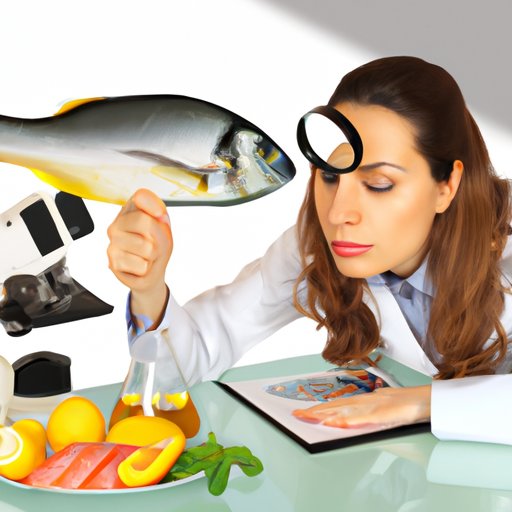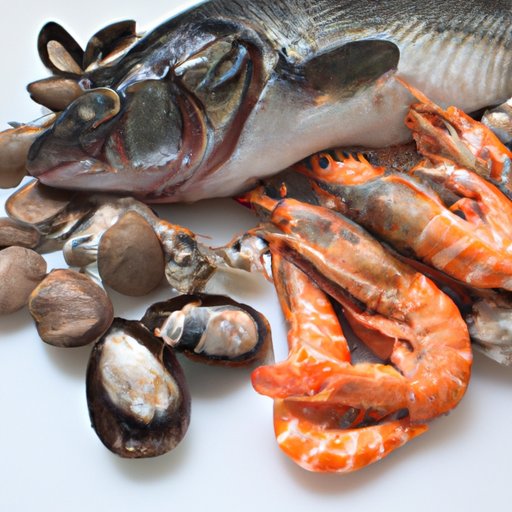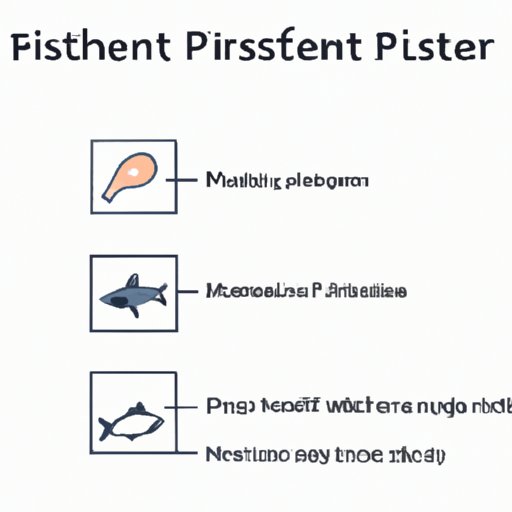Introduction
Eating fish every day is a popular dietary choice as it is considered to be one of the healthiest sources of protein. It is also packed with essential vitamins and minerals, including omega-3 fatty acids, which are known to have numerous health benefits. This article will explore the potential health benefits and risks associated with eating fish everyday, as well as providing tips on how to balance this food group with other proteins.

Examining the Nutritional Benefits of Eating Fish Every Day
Fish is an excellent source of lean protein, vitamins, and minerals. It is also low in saturated fat, making it a healthier alternative to red meat and other animal proteins. One of the major health benefits of eating fish is that it is high in omega-3 fatty acids, which are essential for good health. Omega-3 fatty acids are linked to a number of positive health outcomes, including improved cognitive function, reduced risk of heart disease, and a lower risk of certain types of cancer.
Fish is also a great source of vital vitamins and minerals, such as vitamin D, selenium, and iodine. Vitamin D helps to maintain strong bones and teeth, while selenium and iodine help to support the immune system. Additionally, fish is an excellent source of protein, which is essential for building and repairing muscles, as well as maintaining healthy skin, hair, and nails.
Exploring the Pros and Cons of Making Fish a Daily Dietary Staple
Benefits of Eating Fish Every Day
There are numerous benefits to adding fish to your daily diet. Here are some of the most notable benefits:
- Lower Risk of Heart Disease: Studies have shown that consuming fish regularly can reduce the risk of heart disease due to its high content of omega-3 fatty acids. These fatty acids help to reduce inflammation and cholesterol levels, which can help to protect against heart disease.
- Improved Cognitive Function: Omega-3 fatty acids found in fish are also beneficial for brain health. Studies have shown that consuming a diet rich in omega-3s can improve memory and concentration.
- Reduced Risk of Certain Cancers: Research has shown that eating fish regularly can reduce the risk of certain types of cancer, such as breast and prostate cancer.
Potential Downsides of Eating Fish Every Day
Although there are many health benefits associated with eating fish, there are also some potential downsides to consider. These include:
- Contamination from Heavy Metals: Some fish contain heavy metals, such as mercury and lead, which can be harmful to our health if consumed in large amounts. It is important to choose fish that are low in these contaminants, such as wild-caught salmon and sardines.
- High Levels of Sodium: Many fish are high in sodium, which can increase blood pressure and put strain on the kidneys.

Investigating the Health Risks of Eating Too Much Seafood
While eating fish every day can be beneficial for our health, it is important to be aware of the potential risks associated with eating too much seafood. These include:
- Mercury Poisoning: Mercury is a toxic metal found in some fish, such as tuna, shark, and swordfish. Eating large quantities of contaminated fish can lead to mercury poisoning, which can cause a range of symptoms, including nausea, vomiting, and headaches.
- Bacterial Infections: Eating raw or undercooked fish can increase the risk of bacterial infections, such as salmonella. It is important to ensure that all fish is cooked thoroughly before consumption.
- Allergic Reactions: Some people may be allergic to certain types of fish, such as salmon or cod. Symptoms of an allergic reaction may include itching, swelling, and difficulty breathing.

Dispelling Common Myths About Eating Fish Every Day
It is important to be aware of the potential myths surrounding the consumption of fish. Here are some of the most common myths, and the facts behind them:
- Eating Fish is Unhealthy: This is not true. Eating fish every day can provide numerous health benefits, as outlined above.
- Farmed Fish is Unsafe: Farmed fish can be just as safe as wild-caught fish if it is sourced from a reputable supplier. It is important to do your research when buying farmed fish to ensure that it is of high quality.
- Eating Fish Causes Weight Gain: Eating fish does not directly cause weight gain. However, it is important to be aware of the calories and fat content of the fish you are eating, as some fish can be higher in fat than others.

Understanding How to Balance Eating Fish with Other Protein Sources
Eating fish every day can provide numerous health benefits. However, it is important to ensure that you are getting a variety of proteins in your diet. This means that it is important to mix up your protein sources and try to incorporate different types of fish, as well as other sources of protein, such as legumes, nuts, and seeds.
Variety of Proteins: Eating a variety of proteins is important as it ensures that you are getting a wide range of essential nutrients. Try to incorporate different types of fish, as well as plant-based proteins, such as beans, lentils, and quinoa.
Alternatives to Fish: If you are looking for alternatives to fish, there are plenty of options available. Plant-based proteins, such as tofu, tempeh, and seitan, are all excellent sources of protein. Nuts and seeds, such as almonds, walnuts, and chia seeds, are also great sources of protein.
Analyzing the Impact of Eating Fish on Your Overall Wellness
As discussed above, there are numerous benefits to eating fish every day. Not only can it help to reduce the risk of certain diseases, but it can also have a positive impact on your overall wellness. Here are some of the ways that eating fish can benefit your mental and physical health:
- Positive Effects on Mental Health: Eating fish can have a positive effect on mental health due to its high content of omega-3 fatty acids. Omega-3s can help to reduce stress and anxiety, as well as boost mood and cognitive function.
- Positive Effects on Physical Health: Eating fish can also have a positive effect on physical health. The vitamins and minerals found in fish can help to reduce inflammation, improve joint health, and boost immunity.
Identifying Healthy Alternatives to Eating Fish Everyday
If you are looking for healthy alternatives to eating fish every day, there are plenty of options available. Here are some of the most popular options:
- Plant-Based Proteins: Plant-based proteins, such as beans, lentils, and quinoa, are excellent sources of protein and can provide a range of essential vitamins and minerals. They are also low in saturated fat and cholesterol.
- Soy-Based Proteins: Soy-based proteins, such as tofu and tempeh, are also great sources of protein. They are rich in iron and calcium and are low in fat and calories.
- Nuts and Seeds: Nuts and seeds, such as almonds, walnuts, and chia seeds, are great sources of protein, vitamins, and minerals. They are also high in fiber and can help to keep you feeling full for longer.
Conclusion
Eating fish every day can provide numerous health benefits, including improved cognitive function, reduced risk of heart disease, and a lower risk of certain cancers. However, it is important to be aware of the potential risks associated with eating too much seafood, such as contamination from heavy metals and bacterial infections. Additionally, it is important to ensure that you are getting a variety of proteins in your diet by incorporating other sources of protein, such as plant-based proteins, nuts, and seeds.
In conclusion, eating fish every day can be beneficial for our health, provided that it is done in moderation and balanced with other sources of protein. It is important to remember to check the source of the fish you are eating, as well as to cook it thoroughly to reduce the risk of contamination. By following these guidelines, you can enjoy the numerous health benefits of eating fish every day.
(Note: Is this article not meeting your expectations? Do you have knowledge or insights to share? Unlock new opportunities and expand your reach by joining our authors team. Click Registration to join us and share your expertise with our readers.)
